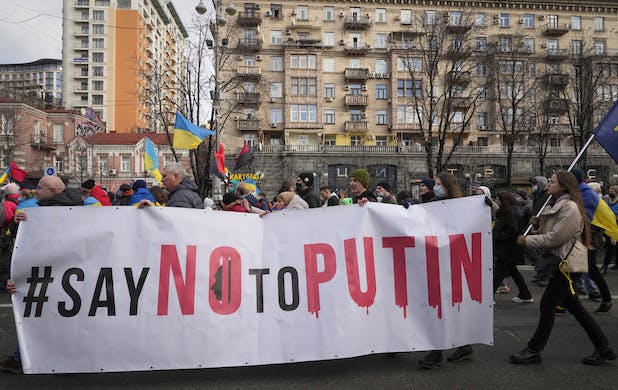United Against Putin, Ex-Soviet Jews in Brooklyn Struggle With Ukrainian Identity
While a large segment of New York’s Ukrainian immigrants oppose Russia’s aggression, they don’t necessarily think of themselves as Ukrainians.

With Russian troops massed along the Ukrainian border, Ukrainians in America are mobilizing in solidarity with Ukraine, standing against the Russian threat to Ukrainian sovereignty.
Yet while a large segment of New York’s Ukrainian immigrants — Russian-speaking Jews, born in the Ukrainian Soviet Socialist Republic — oppose Russia’s aggression, they don’t necessarily think of themselves as Ukrainians.
In the 1970s and 1980s, Jewish refugees from Soviet Ukraine and Russia settled at Brighton Beach, which became known as “Little Odessa,” and pioneered southern Brooklyn’s post-Soviet enclave.
As emigres from the Ukrainian SSR, these refugees never lived in an independent Ukrainian state. Under Soviet rule, their passports identified their nationality as “Jewish” — rather than Ukrainian — unlike their non-Jewish neighbors, who were not subject to the anti-Semitic discrimination of the Soviet regime.
The distinction between Jewish and Ukrainian still plays a role in the self-conception of Ukrainian-born Jews. Many members of this community do not identify as Ukrainian but express political support for Ukraine against Russia and President Putin.
Irina Rakhlis, a Manhattan Beach resident, was born in Kyiv but does not identify as Ukrainian. She describes herself as a “Russian-speaking Jew,” whose upbringing in Kyiv was more culturally Soviet than Ukrainian. Her family immigrated to the United States in 1989.
In Kyiv, Ms. Rakhlis studied Ukrainian as a second language in school. She recalls that her Ukrainian teacher discriminated against Jewish students.
“I always had a negative feeling toward anything Ukrainian because I associated it with anti-Semitism. The Ukrainian nationalists were the most anti-Semitic,” she says.
Her grandparents told her stories of pogroms in their childhood shtetls — often carried out by popular Ukrainian figures. “I remember my parents saying it’s a Ukrainian hero, but it’s really a person who slaughtered Jews,” she says.
Today, Ms. Rakhlis is less hostile toward Ukrainian nationalist ambitions in the face of a potential Russian invasion. She is “very anti-Putin,” and she sees similarities to her own Zionism in Ukraine’s struggle for sovereignty.
“It reminds me of self-determination. I respect peoples’ rights to have their own national language and identity,” she says. Still, her Zionism is stronger than her sympathy for Ukrainian independence.
“I’m not in pain as if it’s something happening in Israel. I just don’t have that connection to Ukraine.”
Igor Draystel, who immigrated to the United States in 2000, also struggles to identify with Ukraine. A 46-year-old who resides near Coney Island, he lived in Ukraine for nearly a decade after the collapse of the Soviet Union. He is originally from Nikolayev, a southern port city east of Odessa.
Mr. Draystel was a senior in high school when the Soviet Union collapsed and remembers the Ukrainian independence referendum. Over the past 30 years, he has watched the transformation of Ukrainian society.
“From the Orange Revolution in 2004, in my communication with my friends, I started seeing this Ukrainian national identity, a pride in their own independence, unity, and nation-state, growing exponentially,” he says. “But it was in 2014, in the Maidan Revolution, that everyone was reborn as fans of Ukrainian independence.”
He adds: “I find it hard to identify as Ukrainian. I feel more like an Russian-speaking American Jew. It’s still hard for me to say that [Ukraine]’s ‘my people’ or ‘my country’ but I still sympathize with it.”
Boris Korotyshevsky, a Coney Island resident, is less ambivalent toward Ukraine. The 69-year-old was born in Kyiv and immigrated to the U.S. from the Soviet Union in 1990, and views Ukraine “as a motherland.”
“I think of myself as a Ukrainian Jew,” says Mr. Korotyshevsky. “Ukraine is the place where I was born, raised, and spent my youngest years. My father’s grave is there. I can’t separate myself from Ukraine.”
Despite their differing feelings toward Ukraine, all three oppose Mr. Putin and support Ukraine’s bid to join NATO. Even so, they are all skeptical that the Ukrainian President, Volodymyr Zelensky, will be able to handle the situation.
“He’s in over his head,” says Mr. Draystel. “He’s a good comedian and businessman elected by a PR machine, but he doesn’t have what it takes to be a successful president.”
Mr. Zelensky is the country’s first Jewish president.
“I don’t have pride in that fact,” says Mr. Draystel. “But I was happy for the state because the Russian propaganda against Ukraine is built on accusations of fascism and anti-Semitism. Then the country that these guys are painting as Nazis elect a Jewish president with 78% of the vote? You can’t beat that.”

